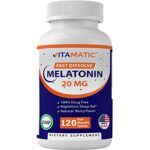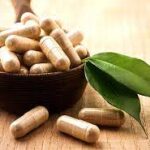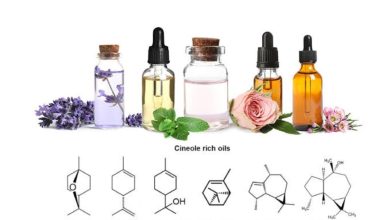How Does Ashwagandha Compare to Melatonin for Sleep?

What is ashwagandha?
Ashwagandha (Withania somnifera) is an herb used in Ayurveda, the traditional medicine of India. Its root has a horsey smell (in Sanskrit, ashva means “horse” and gandha means “smell”) and is said to confer the strength and virility of a horse. Various parts of the plant are used, but the most common in supplements is an extract of its roots.
A number of studies suggest that it has anxiolytic (anti-anxiety) effects; studies are mostly supportive of a notable effect of ashwagandha for this purpose, and it seems to reduce cortisol levels. However, more research is needed before we can have a great deal of confidence in it or know the optimal dose. Ashwagandha may also be able to reduce insomnia, fatigue, and the symptoms of depression, but it hasn’t been well-researched for these purposes.
It may increase power output in untrained subjects during resistance exercise and anaerobic running, but this observation is based on a small amount of research and more is needed. It may lead to small reductions in blood glucose, blood pressure, and LDL-cholesterol, while slightly increasing HDL-cholesterol. Additionally, it may modestly increase testosterone and sperm quality in infertile men.
What Is Melatonin?
Melatonin is a natural hormone that is produced by the pineal gland in the brain and then released into the bloodstream. Darkness prompts the pineal gland to start producing melatonin while light causes that production to stop. As a result, melatonin helps regulate circadian rhythm and synchronize our sleep-wake cycle with night and day. In doing so, it facilitates a transition to sleep and promotes consistent, quality rest.
Melatonin created within the body is known as endogenous melatonin, but the hormone can also be produced externally. Exogenous melatonin is normally made synthetically in a laboratory and, as a dietary supplement, it is most often sold as a pill, capsule, chewable or liquid.
Melatonin supplement is taken to adjust the body’s internal clock. Melatonin is most commonly used for insomnia and improving sleep in different conditions. For example, it is used for jet lag, for adjusting sleep-wake cycles in people whose daily work schedule changes (shift-work disorder), and for helping people establish a day and night cycle.
How long does it take for Ashwagandha to work?
While effects can vary from person to person and on the dosage, taking Ashwagandha in capsule form at least a half hour before bedtime should allow the herb time to work its way through your system and deliver its relaxation benefits. It’s crucial to emphasize that the effectiveness of Ashwagandha may be delayed with low-quality products. Opt for a premium option such as NextEVo’s Ashwagandha for a quicker onset of desired effects.
How long does it take for melatonin to work?
Generally, it takes about 30 min to 1 hour for the effects of melatonin to kick in and for the medication to begin to work because your body absorbs melatonin rapidly. Most melatonin supplements are released into the bloodstream immediately after taking them. However, some formulations are designed for extended-release. This means small amounts of melatonin enter the bloodstream over time. Time-released melatonin is intended to mimic the body’s natural production of melatonin, which occurs throughout the night.
It is recommended that you take melatonin 30 to 60 minutes before bedtime. However, the best time to take melatonin is different for each person. Everyone absorbs medication at different rates. To start, take melatonin 30 minutes before bed. You can adjust the timing depending on how long it takes for you to fall asleep.
Does Ashwagandha contain melatonin?
No, ashwagandha does not contain melatonin. Withaferin-A and withanone are the major biologically active constituents of ashwagandha and are believed to be involved in the majority of biological functions linked to Ashwagandha. However, there are supplements, especially gummies which contain ashwagandha and melatonin as active ingredients.
How Does Ashwagandha Compare to Melatonin for Sleep?
Melatonin is not an herb, but a hormone that our bodies naturally produce to regulate our sleep cycle. Unlike Ashwagandha, most melatonin on the market is synthetic — so many prefer it as a natural alternative to melatonin. Melatonin produces side effects that can include dependency and a feeling of grogginess the morning after — neither of these effects has been widely reported in those who take Ashwagandha. But Ashwagandha may cause mild drowsiness and sedation for some people.
The upside is that the side effects of melatonin usually subside as your body adjusts.
Side effects vary, but include:
• Irritability
• Drowsiness
• Nausea
• Diarrhea
• Headache
Melatonin has also been known to exacerbate depressive symptoms, and should be used with caution in those suffering from depression. Experiencing side effects doesn’t always mean that you should stop taking melatonin. The decision to stop will depend on the severity of your side effects, and whether they improve or continue.
Of course, it’s all about tolerance, too. If you take melatonin and repeatedly experience cramps or diarrhea the next day, you might be sensitive and need to consider other options for better sleep, perhaps chamomile tea or lavender oil.
To reduce the likelihood of side effects, always start with a low dose of melatonin. Only increase your dose as needed.
Many brands of synthetic melatonin contain 5 to 10 milligrams (mg) per serving, which is more than what people often need to regulate their sleep cycle.
Some adults only need a little melatonin, while others need more. Children can typically get by with a lesser amount, too.
This doesn’t mean that you can’t take 5 or 10 mg every night, but you should discuss this with your doctor first to ensure your body can handle a larger dosage.
Also, consult with your doctor if you take any prescription medication. This includes drugs for depression and diabetes, as well as anticoagulation medication, immunosuppressants, and corticosteroids.
Melatonin can also cause an inflammatory response in the body, so the supplement isn’t an ideal choice for people who have certain autoimmune diseases.





